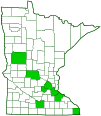garden ghost spider
(Hibana gracilis)
Conservation • Description • Habitat • Biology • Distribution • Taxonomy
|
|
||||||||||||||
Description |
Garden ghost spider is a common, small, wandering spider. It occurs in the United States east of the Great Plains, in southern Quebec and Ontario, and in Mexico. It is uncommon in Minnesota, where it is at the northwestern extent of its range. It spends the day in a silken tube in a rolled up or folded over leaf, and it hunts on plant foliage at night. Females are ¼″ (6.4 to 7.0 mm) in length and have a 5⁄16″ to ½″ (8 to 12 mm) legspan. The front part of the body (cephalothorax), consisting of the head and thorax, is egg shaped and longer than wide. The upper side (carapace) is yellowish-orange. It is sparsely covered with short hairs (setae), and there are a few long seta around the eyes. In the front, the area around the eyes is darker orangish-brown. There are eight eyes in two rows of four. The front (anterior) row is slightly curved backward. The anterior outer (lateral) eyes (ALE) are slightly larger than the anterior middle (median) eyes (AME). The rear (posterior) eye row is slightly curved forward. All of the eyes are narrowly ringed with black. Two indistinct, dark, broken, longitudinal lines extend from the posterior lateral eyes (PLE) to the rear of the carapace. Two similar but shorter and usually less distinct lines extend back from the posterior median eyes (PME). The mouthparts (chelicerae), corresponding to the jaws, are relatively long, slender, and dark orangish-brown or dark brown. Each fang rests in a furrow between two ridges (margins). The outer margin (promargin) has three or four teeth. The inner margin (retromargin), closest to the mouth, has seven to nine teeth. The abdomen is egg-shaped and off white to grayish-green, with two longitudinal rows of minute reddish or brown spots. The legs are relatively long, slender, and pale orangish-yellow, with no dark markings. Males are similar but smaller, 3⁄16″ to ¼″ (5.7 to 6.5 mm) in length. |
Size |
Female Body Length: ¼″ (6.4 to 7.0 mm) Male Body Length: 3⁄16″ to ¼″ (5.7 to 6.5 mm) Legspan: 5⁄16″ to ½″ (8 to 12 mm) |
Web |
None |
Similar Species |
Habitat |
|
Biology |
Season |
|
Behavior |
Ghost spiders hunt at night. They spend the day in a silken retreat in a rolled up or folded over leaf. |
Life Cycle |
|
Food |
|
Distribution |
||
|
Sources |
|
| 4/28/2024 | ||
Occurrence |
||
|
||
Taxonomy |
|
Class |
|
Order |
|
Suborder |
Araneomorphae (Typical Spiders) |
Infraorder |
Entelegynae |
Zoosection |
RTA clade (RTA Clade Spiders) |
Zoosubsection |
Dionycha clade spiders |
Family |
Anyphaenidae (ghost spiders) |
Genus |
Hibana |
Unitl recently, this species was included in the genus Aysha. In 1991, several Aysha species, including Aysha gracilis, were transferred to the new genus Hibana. |
|
Subordinate Taxa |
|
|
|
Synonyms |
|
Aysha gracilis |
|
Common Names |
|
garden ghost spider |
|
Glossary
Carapace
The hard, upper (dorsal), shell-like covering (exoskeleton) of the body or at least the thorax of many arthropods and of turtles and tortoises. On crustaceans, it covers the cephalothorax. On spiders, the top of the cephalothorax made from a series of fused sclerites.
Cephalothorax
The front part of the body of various arthropods, composed of the head region and the thoracic area fused together. Eyes, legs, and antennae are attached to this part.
Chelicerae
The pair of stout mouthparts, corresponding to jaws, in arachnids and other arthropods in the subphylum Chelicerata.
Seta
A stiff, hair-like process on the outer surface of an organism. In Lepidoptera: A usually rigid bristle- or hair-like outgrowth used to sense touch. In mosses: The stalk supporting a spore-bearing capsule and supplying it with nutrients. Plural: setae.
Visitor Photos |
||
Share your photo of this arachnid. |
||
This button not working for you? |
||
Babette Kis |
||
 |
||
| Hibana gracilis ghost spider |
|
|
Alfredo Colon |
||
 |
 |
|
|
||
 |
||
MinnesotaSeasons.com Photos |
||
|
||
|
||

Slideshows |
|

Visitor Videos |
||
Share your video of this arachnid. |
||
This button not working for you? |
||
|
Other Videos |
||
Garden Ghost Spider makes a quick escape |
About
Sep 10, 2022 |

Visitor Sightings |
||
Report a sighting of this arachnid. |
||
This button not working for you? |
||
| Alfredo Colon 8/16/2022 |
Location: Albany, NY |
 |
| Alfredo Colon 8/7/2022 |
Location: Albany, NY |
 |
| Alfredo Colon 8/4/2022 |
Location: Albany, NY |
 |
| Babette Kis 7/16/2021 |
Location: Barnes Prairie, Racine Co., WI |
 |
MinnesotaSeasons.com Sightings |
||
|

Created: 1/10/2023 Last Updated: © MinnesotaSeasons.com. All rights reserved. |


